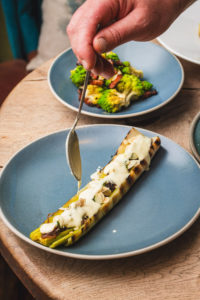The Gladwin Brothers will be serving up a tasty and sustainability driven alternative this Veganuary – a special ‘Regenuary’ menu which only uses ingredients that are made regeneratively.
The set menu will be available from today until 31st January 2024 at their five farm-to-fork neighbourhood restaurants: The Shed, Rabbit, Sussex, The Fat Badger and The Black Lamb.

Harnessing a philosophy of “what grows together, goes together”, the ‘local and wild’ restaurant collection serves modern and seasonal cuisine, with menus curated around high-welfare and hand-reared meat and British produce sourced from local farmers, hedgerows and the surrounding coast.
With the family vineyard in West Sussex, Nutbourne, the restaurants also showcase award-winning English wine as the perfect pairing to the dishes.
Through regenerative farming practices, they improve the resources they use rather than destroying or depleting them. The environmentally themed six-course menu (£48pp) along with the regenerative practices used for each delicious dish can be found below:
MOUTHFULS
Mushroom Marmite Eclairs
Red Endive, Stilton, Beetroot Jam
The mushroom marmite éclair utilises dehydrated leftover mushrooms, pulverised into a powder, ensuring both zero waste and the richest umami flavors.
BEACH
Rope Grown Mussels, White Wine Butter Sauce, Charred Kale, Gladwin Chorizo
The rope method for rearing mussels requires no inputs – no chemicals and no added feed, making them as sustainable as it gets
FIELD
Stuffed Leek Heart, Cheddar Fondue, Onion Confit, Candied Hazelnuts
By practising minimum soil disturbance, covering soils with mulch and composting, they keep the soils rich and the vegetables healthy and sustainable
SEA
Paprika Cuttlefish, Blackbeans, Almonds, Sweet Chilli
THey use male brown crab, pot-caught from the Dorset/Devon coastline, to bring together unexpected flavours in this comforting seafood pasta dish.
WOODS
Wild Fallow Deer, Hen of the Woods Mushroom, Pickled Wet Walnut Emulsion, Tarragon Crumb
Fallow deers, without predators, can rapidly overpopulate. Mindful and sustainable hunting helps balance their ecosystem and enhance surrounding habitats.
DESSERT
Spotted Dick, Mincemeat Sponge, Burnt Butter Custard
The perfect old-fashioned English dessert for cold months, using dried fruit preserved from the summer months and leftover Christmas mincemeat to create a low-waste treat.
How are the Gladwin Brothers exercising regenerative practices and improving resources and processes involved in food agriculture and production?
- The growers and suppliers are regenerating the soil by using a mixture of crops and animals in a specific rotation to better the soil and environment around it.
- The growers have their next 3 years always planned to make sure the rotation is getting the most out of the last crop and giving the best to the next crop.
- The Gladwin Brothers conduct in-house butchery and engage in mindful hunting in local areas. For example, the sustainable harvesting of wild deer helps maintain ecological balance, preventing overpopulation that could otherwise disrupt the surrounding habitats.
- The Gladwin Brothers follow sustainable practices in farming and catching of seafood, such as rope method farming. They ensure the use of seafood that is not overfished or obtained through unsustainable fishing methods such as Bottom Trawling.
- The Gladwin Brother restaurants actively advocate for the reutilization of leftovers and scraps. These are creatively incorporated into new dishes by methods like dehydration, powdering, or being used to create flavourful stocks.
- The Gladwin Brothers work with fish suppliers that only use MSC certified fish or By-Catch specials which are fish caught unintentionally and would otherwise be thrown back into the waters injured or dead.
- At Nutbourne Vineyards, The Gladwin Brothers also farm sustainably, see here
